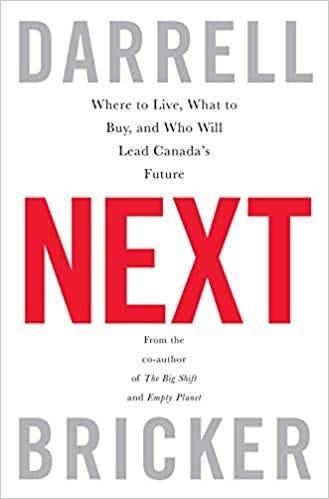Next: Where to Live, What to Buy, and Who Will Lead Canada's Future
by Darrell Bricker
As a Canadian who has lived most of my adult life in the United States, I am aware that Americans eyes immediately glaze over when they see the word "Canada" anywhere in print. Putting aside this gross prejudice (the last acceptable racism really) there are a few things happening that Americans should pay attention to north of the border because its going to affect them too. Canada is going through a historic demographic transformation, and it’s happening very, very fast. The popular image of a largely white, exurban country is already totally out of date. Canada is rapidly urbanizing, aging, and browning, as birthrates plummet and large numbers of immigrants arrive annually in the suburbs of Toronto, Vancouver, Montreal, and Calgary. Rural areas, as well as entire massive provinces of Eastern Canada, are meanwhile going through a demographic collapse that is likely to lead to a future political crisis, as young people stop having children, flock to the major cities, and no immigrants arrive in those quiet regions to replace them. This same urban-exurban divide is being replicated across the West to varying degrees.
Canada in 2050 is going to be something unlike the world has yet seen: A two-ocean power with a fully globalized population. Unlike other Western countries, there is little nativist backlash to high-rates of annual immigration since all political parties long ago embraced it as an economic necessity. Immigration has even become an authentic part of Canada's identity. The historic Anglo-French divide created a complex enough national self-image that most people don't feel mortally threatened by new shifts in national culture. Every year, Canada brings in hundreds of thousands of new high-skilled immigrants from anywhere in the world that is willing to send them, as birthrates for existing Canadians remain below-replacement. Canada is already rapidly on the way to becoming a country in which Asians and Africans compromise strong pluralities with equal claim on national identity as the original European settlers. In the near future, people who look like me will be considered quintessential Canadian natives, as waves of new immigrants arrive from exotic locales. I can already see this happening in the immigrant-heavy suburbs where I grew up.
This book is intended to give businesspeople a window into what Future Canada is going to look like and how they should position themselves in response with the stuff they’re selling. That’s important, especially if you’re an investor, but there’s a bigger story here. The same trends of urbanization, cultural diversification, female empowerment manifesting in low-birthrates, and aging populations are relevant to every Western country. China and Japan are also aging but they may not even survive demographic collapse since they've already decided that death is better than diversity. The West, meanwhile, is likely to be headed into a new Golden Era as waves of new immigrants inject dynamism and energy into the culture and economy. Over time these newcomers will themselves be shaped by existing traditions and patterns of life as previous immigrants have. It’s going to be good, including for old-stock Canadians.
Canada is turning into a country that consists of a few exciting global cities, surrounded by vast empty lands suitable for farming and resource exploration. It's growing fast every year through immigration, but also aging as generations which did not procreate much enter their senescence. There is a lot to be excited about since most Canadians and their leaders have clearly decided to take the plunge into the unknown future, rather than cling onto nostalgia for a diminishing past. Believe it or not, after a long history of irrelevance, there's good reason to think that Canada, a populous, diverse, resource-rich, and urban country, really might become one of the most important places in the world.


I'll have to look into this book. In university I did a few research papers about 19th-20th c. migration to the Americas---not just the US, but also Canada and Brazil, two countries that opened their doors to much of the world after America started to close theirs in the 1920s. From everything I read, it seemed to me that immigrants and their descendants were much more likely to retain their original language in Canada and Brazil than they were in the US, even into the third generation and beyond. And indeed, there are more policies on the books protecting immigrant languages in Canada and Brazil than in the US, though it's nowhere near as robust as what you see with minority language protections in Europe. Though xenophobia cropped every once in a while in Brazil and Canada, it seems to have had much more currency in US politics throughout the era. In any case, openness to immigrant cultures strikes me as very wise policy, at least from an economic standpoint, if for no other reason. A multilingual/immigrant labor force facilitates foreign commerce in a way that's sort of hard to overstate, if you look at some of the data that's out there. Of course, on a "vibes" level, it's also just much more interesting to live in a multicultural setting like that. Though I suppose that's a matter of opinion.